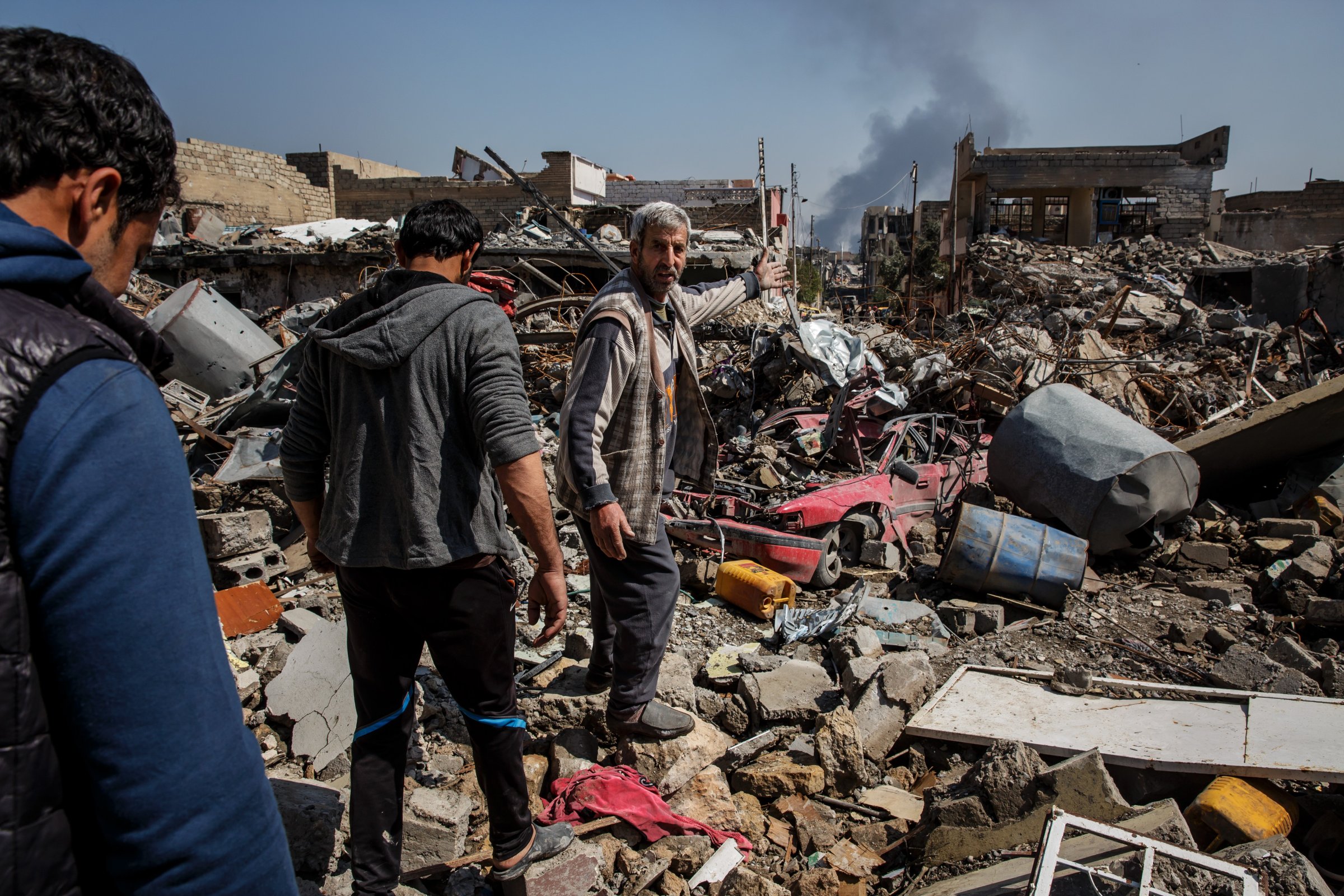
A school, a mosque, a crowded civilian neighborhood. Those are targets that the United States armed forces stand accused of attacking in Syria and Iraq in less than one week in March.
The civilian death toll from American airstrikes in Iraq and Syria is at an all time high since the launch of an international military campaign against the Islamic State (ISIS) in 2014, according to monitoring groups. The spike in reports of civilian deaths is raising questions about whether the Trump administration has loosened the rules of engagement governing U.S. forces in the region.
In the month of March so far, U.S.-led coalition airstrikes resulted in 110 separate incidents of reported civilian casualties, allegedly killing more than 1,200 people, according to Airwars, an organization tracking airstrikes. That number is already triple the previous high posted in January of this year. In January and February, the coalition surpassed Russia — whose forces have launched relentless airstrikes in parts of Syria — in the number of civilians killed, Airwars found.
The deadliest of the alleged attacks was in Iraqi city of Mosul on March 17, in which as many as 200 people died. The U.S.-led military coalition fighting ISIS acknowledged on Saturday that it launched an airstrike in the same location on the same day as the lethal blast. In a statement, the coalition said the attack targeted ISIS fighters and equipment. The Iraqi military blamed the deaths instead on booby traps laid by ISIS fighters. Iraqi military officials however say the coalition has stepped up air strikes in support of the Iraqi ground campaign. The U.S. military is investigating the incident.
In a statement released on Sunday, Centcom commander Gen. Joseph Votel said, “The death of innocent civilians in Mosul is a terrible tragedy. We are investigating the incident to determine exactly what happened and will continue to take extraordinary measure to avoid harming civilians.”
The surge in reported civilian deaths spans the region. In Syria, the U.S. acknowledged an airstrike on a mosque complex outside of Aleppo that killed a reported 46 people on March 16, saying the attack intended to hit a nearby building where members of a jihadist group were meeting. According to Syrian human rights groups, another strike hit a school where displaced families had taken shelter outside the ISIS-held city of Raqqa, killing at least 33 people on March 22. In Yemen, U.S. forces launched more airstrikes in one week than in any single year under the Obama administration.
The recent killings coincide with an escalation in the fighting on the ground in the Iraqi city of Mosul, where Iraqi troops are battling through densely populated neighborhoods in a final push to oust ISIS from the city. The close-quarters combat could partly explain the increase in civilian deaths.
“The sheer number of allegations this month is something we’ve never seen. But again, that may equally be connected to the west Mosul campaign. It’s not clear to us that we wouldn’t have seen these same levels and fatalities under Obama,” says Chris Woods, the head of Airwars.
The allegations come as the ground war against ISIS reaches a crescendo. American-backed Iraqi troops are battling their way through the last neighborhoods under ISIS control in Mosul, a city of more than a million people that the militant group ruled for more than two years following its sweep across Iraq in the summer of 2014. Intense street-to-street fighting in the western section of Mosul raised concern about the estimated half a million people trapped in the area.
In Syria, U.S.-backed militias are approaching the city of Raqqa, the presumed capital of the self-proclaimed Islamic State. The U.S. recently sent Marine artillery to Syria in order to support the militia fighters on the ground there. However, U.S. forces are relying on militia fighters for targeting information, raising further concerns about civilian casualties in the expected battle for the city.
As presidential candidate, Trump vowed to accelerate the war on ISIS launched by President Obama in 2014. Speaking at a campaign rally in November 2015, he famously declared, “I would bomb the sh-t out of ‘em,” referring to oil infrastructure taken over by ISIS. He later suggested the U.S. should kill the families of terrorists. Since taking office, his administration has intensified the use of force in conflicts across the Middle East, nearly doubling the number of U.S. troops in Syria and expanding American operations in Yemen.
The increase in civilian deaths is also raising concerns that the military campaign against ISIS could inadvertently alienate the public in areas reclaimed from the jihadists’ control, sowing the seeds for militancy even after ISIS is defeated. Experts say ISIS’s sophisticated social media operations could amplify the political fallout of any civilian killings.
“If you’re doing a lot of damage to civilians, ISIS is going to be able to shape the message, external to Raqqa or external to Mosul, or wherever it is,” says Lt. Col. Jay Morse, a retired U.S. Army judge advocate, who is now with the Center for Civilians in Conflict, in an interview with TIME. “And now you increase the likelihood that you’re going to fight this exact same fight in another city on another day.”
More Must-Reads from TIME
- Why Trump’s Message Worked on Latino Men
- What Trump’s Win Could Mean for Housing
- The 100 Must-Read Books of 2024
- Sleep Doctors Share the 1 Tip That’s Changed Their Lives
- Column: Let’s Bring Back Romance
- What It’s Like to Have Long COVID As a Kid
- FX’s Say Nothing Is the Must-Watch Political Thriller of 2024
- Merle Bombardieri Is Helping People Make the Baby Decision
Contact us at letters@time.com